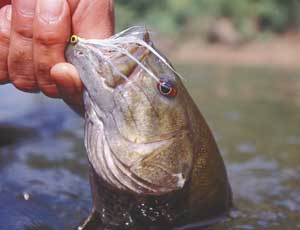
The spirited fight and acrobatic leaps of the smallmouth bass are legendary with anglers.Inch for inch and pound for pound, many consider the smallmouth as the hardest fighting gamefish that swims in freshwater. In fact, the smaller cousin of the more popular largemouth bass might possibly be the perfect gamefish.
Smallmouth bass look similar to the largemouths and spotted bass. The distinguishing characteristic, however, is the mouth. Contrary to its name, the smallmouth bass doesn’t have a small mouth.
In fact, its mouth isn’t much smaller than that of the largemouth bass. Instead, its mouth does not extend beyond the rear border of the eye when closed, whereas the largemouth’s does.
Color varies from yellow-green to olive-green with a bronze reflection when in the water. Its popular nickname, “bronzeback” is derived from this distinctive coloration.
Other nicknames given to the smallmouth bass are “brown bass, browny, green trout, river bass, redeye” and “jumper.”
Young smallmouth bass have several vertically-oriented dark blotches or bars along their sides that usually fade with age. They’re a slender, muscular fish that are almost always mistaken for a fish twice its size when hooked by an angler for the first time.
Smallmouth bass closely associate with bottom structure, preferring rock, rubble, gravel and sand substrates. They also have a preference to some water current but can be found in both rivers and cool-water lakes.
Spawning normally occurs in April and May when water temperatures reach 60 to 65 degrees. Smallmouths feed primarily on small fish, insects, and their favorite food, crayfish.
South Carolina isn’t renowned for smallmouth bass fishing, yet it does provide some excellent opportunities to tangle with this superb gamefish.
In addition to a few lesser-known, marginal locations, two bodies of water provide excellent smallmouth bass fishing in South Carolina. Oconee County’s Lake Jocassee and the Broad River near Blacksburg are prime smallmouth bass water.
Lake Jocassee is the premier smallmouth bass fishery in the Palmetto State. This 7500-acre pristine mountain lake is a true trophy smallmouth bass destination. Fish in the 3- to 5-pound range are caught regularly in its deep, clear waters. Trophy fish exceeding 6 pounds are landed every year.
The state record bronzeback of 9 pounds and 7 ounces, caught by Terry Dodson in 2001, was hauled out of Lake Jocassee’s waters. This catch eclipsed the previous state record which also happened to be caught at Lake Jocassee.
Lake Jocassee’s cool, clear water and rocky outcroppings and banks offer the perfect smallmouth bass habitat. Surprisingly, not many Jocassee anglers target the smallmouth bass.
According to Ken Sloan at the Jocassee Outdoor Center in Salem, most large smallmouth that are weighed in were caught by accident by anglers who were targeting largemouth bass or trout.
The Broad River flows southward from North Carolina, entering South Carolina near the Gaston Shoals Dam. This obscure fishery originated in 1985 when the South Carolina Department of Natural Resources began an experimental stocking of the Broad with fingering smallmouth bass.
Believing the water to be only marginal smallmouth habitat, the fisheries biologists with the DNR were surprised to learn the fish prospered in the shallow, rocky flow.
Today, most of the smallmouth bass caught at this section of the river are in the 1 ½- to 2-pound weight range, although 50-fish days aren’t uncommon. A 4-pound fish is a trophy for this particular fishery.
The Broad River is too rocky and shallow for boats with an outboard motor. Paddling a canoe or kayak is a much more practical way cover the water. Wading and fishing the deeper, more productive sections with slower currents and good structure will lead to the best results.
In addition to fishing light spinning gear, the shallow Broad River offers the opportunity to catch smallmouth bass on the fly rod. Catching feisty bronzebacks with top-water poppers and fly tackle might be one of the best experiences an angler can have.
As water temperatures start slowly creeping higher in February and March, the smallmouth fishing will begin heating up.
Give bigmouth’s little cousin a chance to get you hooked on bronzebacks.



Be the first to comment